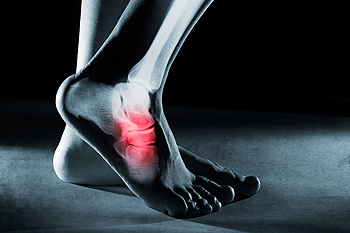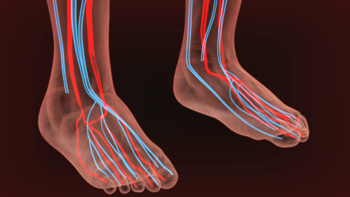North Andover (978) 686-7623
Tewksbury (978) 640-1010
Blog
August 2019
 An injury that majority of runners fear is known as a stress fracture. It is typically caused by frequent running or jogging without properly warming up and stretching the lower legs and feet. It often occurs when the intensity of the workout is increased too quickly. The symptoms that many patients experience include stiffness in the affected area and sore muscles. Additionally, swelling may be noticed on top of the foot, and this can be a result of a stress fracture. The pain may be severe, and it may cause the patient to walk with a different gait. If you are experiencing these types of symptoms, it is advised that you seek the counsel of a podiatrist who can properly diagnosis this condition and offer the best treatment plan for you.
An injury that majority of runners fear is known as a stress fracture. It is typically caused by frequent running or jogging without properly warming up and stretching the lower legs and feet. It often occurs when the intensity of the workout is increased too quickly. The symptoms that many patients experience include stiffness in the affected area and sore muscles. Additionally, swelling may be noticed on top of the foot, and this can be a result of a stress fracture. The pain may be severe, and it may cause the patient to walk with a different gait. If you are experiencing these types of symptoms, it is advised that you seek the counsel of a podiatrist who can properly diagnosis this condition and offer the best treatment plan for you.
Activities where too much pressure is put on the feet can cause stress fractures. To learn more, contact one of our podiatrists from Foot Health Center of Merrimack Valley. Our doctors can provide the care you need to keep your pain free and on your feet.
Dealing with Stress Fractures of the Foot and Ankle
Stress fractures occur in the foot and ankle when muscles in these areas weaken from too much or too little use. The feet and ankles then lose support when walking or running from the impact of the ground. Since there is no protection, the bones receive the full impact of each step. Stress on the feet can cause cracks to form in the bones, thus creating stress fractures.
What Are Stress Fractures?
Stress fractures occur frequently in individuals whose daily activities cause great impact on the feet and ankles. Stress factors are most common among:
- Runners
- People affected with Osteoporosis
- Tennis or basketball players
- Gymnasts
- High impact workouts
Symptoms
Pain from the fractures occur in the area of the fractures and can be constant or intermittent. It will often cause sharp or dull pain with swelling and tenderness. Engaging in any kind of activity which involves high impact will aggravate pain.
If you have any questions please feel free to contact one of our offices located in North Andover, and Tewksbury, MA . We offer the newest diagnostic and treatment technologies for all your foot and ankle needs.
 Research has indicated that there are several forms of heel pain. The most common type is referred to as plantar fasciitis, and this occurs as a result of an inflamed plantar fascia. This is the band of tissue that is located on the sole of the foot, connecting the heel to the toes. Heel bursitis is a condition where pain is felt in the middle of the heel, and can develop as a result of falling from an extended height. Young children who participate in sporting activities may develop Sever’s disease, and this may develop from an inflamed Achilles tendon. Many patients will experience heel pain at some point in their lives, and there are methods to managing the pain and discomfort. If you have any type of heel pain, it is advised to consult with a podiatrist who will perform a proper diagnosis, and begin the correct treatment.
Research has indicated that there are several forms of heel pain. The most common type is referred to as plantar fasciitis, and this occurs as a result of an inflamed plantar fascia. This is the band of tissue that is located on the sole of the foot, connecting the heel to the toes. Heel bursitis is a condition where pain is felt in the middle of the heel, and can develop as a result of falling from an extended height. Young children who participate in sporting activities may develop Sever’s disease, and this may develop from an inflamed Achilles tendon. Many patients will experience heel pain at some point in their lives, and there are methods to managing the pain and discomfort. If you have any type of heel pain, it is advised to consult with a podiatrist who will perform a proper diagnosis, and begin the correct treatment.
Many people suffer from bouts of heel pain. For more information, contact one of our podiatrists of Foot Health Center of Merrimack Valley. Our doctors can provide the care you need to keep you pain-free and on your feet.
Causes of Heel Pain
Heel pain is often associated with plantar fasciitis. The plantar fascia is a band of tissues that extends along the bottom of the foot. A rip or tear in this ligament can cause inflammation of the tissue.
Achilles tendonitis is another cause of heel pain. Inflammation of the Achilles tendon will cause pain from fractures and muscle tearing. Lack of flexibility is also another symptom.
Heel spurs are another cause of pain. When the tissues of the plantar fascia undergo a great deal of stress, it can lead to ligament separation from the heel bone, causing heel spurs.
Why Might Heel Pain Occur?
- Wearing ill-fitting shoes
- Wearing non-supportive shoes
- Weight change
- Excessive running
Treatments
Heel pain should be treated as soon as possible for immediate results. Keeping your feet in a stress-free environment will help. If you suffer from Achilles tendonitis or plantar fasciitis, applying ice will reduce the swelling. Stretching before an exercise like running will help the muscles. Using all these tips will help make heel pain a condition of the past.
If you have any questions please contact one of our offices located in North Andover, and Tewksbury, MA . We offer the newest diagnostic and treatment technologies for all your foot and ankle needs.
Inadequate blood flow in the body is referred to as poor circulation. The symptoms that are associated with this condition often include a tingling or numbing sensation in the feet and hands, the toenails may become brittle and dry, and wounds on the feet may heal slower than usual. If there are some existing medical conditions, it may increase the risk of developing poor circulation. These can include diabetes, elevated blood pressure, and high cholesterol. Research has indicated it may be beneficial to incorporate a gentle exercise program into your daily routine, as this can help to control specific medical conditions. If you are suffering from this ailment, it is suggested that you seek the counsel of a podiatrist who can help you with proper treatment options.
While poor circulation itself isn’t a condition; it is a symptom of another underlying health condition you may have. If you have any concerns with poor circulation in your feet contact one of our podiatrists of Foot Health Center of Merrimack Valley. Our doctors will treat your foot and ankle needs.
Poor Circulation in the Feet
Peripheral artery disease (PAD) can potentially lead to poor circulation in the lower extremities. PAD is a condition that causes the blood vessels and arteries to narrow. In a linked condition called atherosclerosis, the arteries stiffen up due to a buildup of plaque in the arteries and blood vessels. These two conditions can cause a decrease in the amount of blood that flows to your extremities, therefore resulting in pain.
Symptoms
Some of the most common symptoms of poor circulation are:
- Numbness
- Tingling
- Throbbing or stinging pain in limbs
- Pain
- Muscle Cramps
Treatment for poor circulation often depends on the underlying condition that causes it. Methods for treatment may include insulin for diabetes, special exercise programs, surgery for varicose veins, or compression socks for swollen legs.
As always, see a podiatrist as he or she will assist in finding a regimen that suits you. A podiatrist can also prescribe you any needed medication.
If you have any questions, please feel free to contact one of our offices located in North Andover, and Tewksbury, MA . We offer the newest diagnostic and treatment technologies for all your foot care needs.
Tarsal tunnel syndrome, also known as TTS, occu rs when the posterior tibial nerve becomes compressed and damaged, in turn causing inflammation. This is usually caused by continual overuse of the foot and ankle such as prolonged walking, running, standing, or exercising. If left untreated, TTS can cause permanent nerve damage. Some common treatments are wearing specialized shoes and inserts, over-the-counter pain and anti-inflammatory medications, physical therapy and rest. Strengthening exercises should be done to help prevent problems. These exercises include heel-toe raises, pencil toe lifts and balance exercises. If not treated right away, TTS can lead to the risk of developing other conditions such as flat feet, fallen arches, rheumatoid arthritis, varicose veins and the susceptibility to becoming overweight. If you notice any symptoms of TTS, it is important that you see a podiatrist right away.
rs when the posterior tibial nerve becomes compressed and damaged, in turn causing inflammation. This is usually caused by continual overuse of the foot and ankle such as prolonged walking, running, standing, or exercising. If left untreated, TTS can cause permanent nerve damage. Some common treatments are wearing specialized shoes and inserts, over-the-counter pain and anti-inflammatory medications, physical therapy and rest. Strengthening exercises should be done to help prevent problems. These exercises include heel-toe raises, pencil toe lifts and balance exercises. If not treated right away, TTS can lead to the risk of developing other conditions such as flat feet, fallen arches, rheumatoid arthritis, varicose veins and the susceptibility to becoming overweight. If you notice any symptoms of TTS, it is important that you see a podiatrist right away.
Tarsal tunnel syndrome can be very uncomfortable to live with. If you are experiencing tarsal tunnel syndrome, contact one of our podiatrists of Foot Health Center of Merrimack Valley. Our doctors can provide the care you need to keep you pain-free and on your feet.
Tarsal Tunnel Syndrome
Tarsal tunnel syndrome, which can also be called tibial nerve dysfunction, is an uncommon condition of misfiring peripheral nerves in the foot. The tibial nerve is the peripheral nerve in the leg responsible for sensation and movement of the foot and calf muscles. In tarsal tunnel syndrome, the tibial nerve is damaged, causing problems with movement and feeling in the foot of the affected leg.
Common Cause of Tarsal Tunnel Syndrome
- Involves pressure or an injury, direct pressure on the tibial nerve for an extended period of time, sometimes caused by other body structures close by or near the knee.
- Diseases that damage nerves, including diabetes, may cause tarsal tunnel syndrome.
- At times, tarsal tunnel syndrome can appear without an obvious cause in some cases.
The Effects of Tarsal Tunnel Syndrome
- Different sensations, an afflicted person may experience pain, tingling, burning or other unusual sensations in the foot of the affected leg.
- The foot muscles, toes and ankle become weaker, and curling your toes or flexing your foot can become difficult.
- If condition worsens, infections and ulcers may develop on the foot that is experiencing the syndrome.
A physical exam of the leg can help identify the presence of tarsal tunnel syndrome. Medical tests, such as a nerve biopsy, are also used to diagnose the condition. Patients may receive physical therapy and prescriptive medication. In extreme cases, some may require surgery.
If you have any questions please feel free to contact one of our offices located in North Andover, and Tewksbury, MA . We offer the newest diagnostic and treatment technologies for all your foot and ankle needs.
Blog Archives
- 2024
- 2023
- 2022
- 2021
- 2020
- 2019
- 2018









